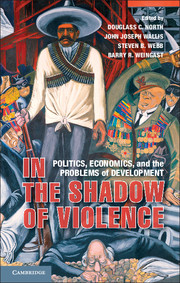Book contents
- Frontmatter
- Contents
- Contributors
- Acknowledgments
- One Limited Access Orders
- Two Bangladesh
- Three Fragile States, Elites, and Rents in the Democratic Republic of Congo (DRC)
- Four Seeking the Elusive Developmental Knife Edge
- Five Change and Continuity in a Limited Access Order
- Six India’s Vulnerable Maturity
- Seven Entrenched Insiders
- Eight From Limited Access to Open Access Order in Chile, Take Two
- Nine Transition from a Limited Access Order to an Open Access Order
- Ten Lessons
- Index
- References
Three - Fragile States, Elites, and Rents in the Democratic Republic of Congo (DRC)
Published online by Cambridge University Press: 05 December 2012
- Frontmatter
- Contents
- Contributors
- Acknowledgments
- One Limited Access Orders
- Two Bangladesh
- Three Fragile States, Elites, and Rents in the Democratic Republic of Congo (DRC)
- Four Seeking the Elusive Developmental Knife Edge
- Five Change and Continuity in a Limited Access Order
- Six India’s Vulnerable Maturity
- Seven Entrenched Insiders
- Eight From Limited Access to Open Access Order in Chile, Take Two
- Nine Transition from a Limited Access Order to an Open Access Order
- Ten Lessons
- Index
- References
Summary
Introduction
The Democratic Republic of Congo (DRC), formerly Zaire and Belgian Congo, was theater to one of the most extensive post-Cold War wars in Africa, following the collapse in 1997 of the long-standing Mobutu regime. Often seen as the archetypal African kleptocracy, Mobutu’s formal ascension to the presidency in 1965 temporarily stabilized the Congo in the wake of political instability and regional secession attempts following independence in 1960. Throughout various regime phases, natural resource extraction has played a central role in the governance of this vast country of 68 million people and 250 ethnic groups, with four times the area of France and as many as 700 local languages and dialects.
By 2012, the international community had devoted significant resources to the stabilization of the Congo and the government of President Joseph Kabila. Following its initial deployment in 1999, the UN continues to maintain a force of almost twenty thousand troops in the DRC under the United Nations Stabilisation Mission in the Congo (MONUSCO). Despite its resource wealth, the DRC continues to be subject to large aid. At the same time, concerns linger over poor governance and a predatory civil and military apparatus (including extensive human rights violations and sexual violence), as well as over the army’s inability to defend the country’s population or its international borders. The latter phenomenon is most vividly reflected by instability in the country’s east.
- Type
- Chapter
- Information
- In the Shadow of ViolencePolitics, Economics, and the Problems of Development, pp. 70 - 111Publisher: Cambridge University PressPrint publication year: 2012
References
- 3
- Cited by



